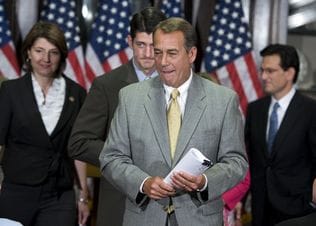GOP takes big lead on generic ballot


It's a bad year to be a Democrat.
After spending most of an August recess campaigning hard in their home districts, touting their local accomplishments, reminding their voters how bad things were under George W. Bush, and carefully keeping their distance from polarizing party leaders like Nancy Pelosi and Barack Obama, Democratic Representatives were stunned by the results of a Gallup Poll Monday, which showed a generic Republican candidate leading a generic Democrat by 10%.
The generic ballot poll determines voter preference for party by asking registered voters whether they'd prefer a Republican or Democratic Congressman in the November election, without naming a specific candidate. In Gallup's entire history of tracking the generic ballot- dating back to 1942- the Republicans have never had so great a margin. This reflects the Democrats' historical dominance of the U.S. House of Representatives, in which it held a majority for 40 continuous years from 1955-1995.
As Gallup notes, "Republicans usually turn out in higher numbers in midterm elections than do Democrats," and that polling of "likely voters" closer to the election is likely to skew even more heavily in favor of the Republicans than Monday's poll of "registered voters." Add to this the 50% enthusiasm level of registered Republican voters, which is twice that of the 25% level enthusiasm of Democratic voters, and from Gallup's angle it looks like 2010 is going to be a landslide for the GOP.
In 1994, two years into the first term of a Democratic White House administration and with only a 5% lead on the generic ballot, the Republican Party swept the U.S. House and took the majority of seats for the first time in 40 years. The "Republican Revolution" as it was hailed, was the result of a 54-seat swing from Democrats to Republicans. Fifteen years later, with twice the generic ballot lead, a 54-seat swing today would give the Republicans 232 seats, and whittle the Democratic lead down to 201 seats (there are presently two vacancies), placing the Republicans in the majority again.
The record support for Republican congressional candidates is a clear rebuke to the last nineteen months of radically consolidating Federal power, socializing multiple U.S. industries, and spending tax dollars at unprecedented levels (which means the deficit is even higher than it was when the last president was spending tax dollars at unprecedented levels). When Americans voted for change in 2008, they meant the curtailment of a runaway executive branch in Washington, not a drastic reordering of the entire country along the lines of centrally-planned, European-style welfare states.
While the Democrats' miscalculation has very likely cost them the 2010 election, the Republicans will only hold on to and strengthen their majority if they heed the voice of the people, and set about the work of curtailing the size, role, and influence of Washington. An elephant may never forget, but any Republican gains for 2010 will be short-lived if they forget what cost their party the 2006 and 2008 elections- uncritical support for the Washington establishment's exploding deficits, violations of civil liberties, and pro-war-any-war foreign policy.
The GOP may be tempted to party like it's 1994, but let's just hope it isn't tempted to spend like it's 2005.


